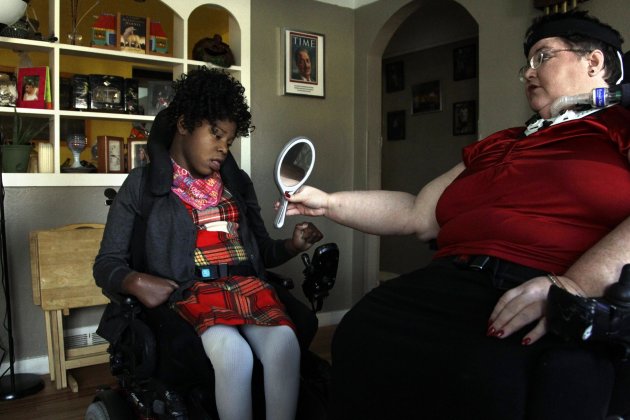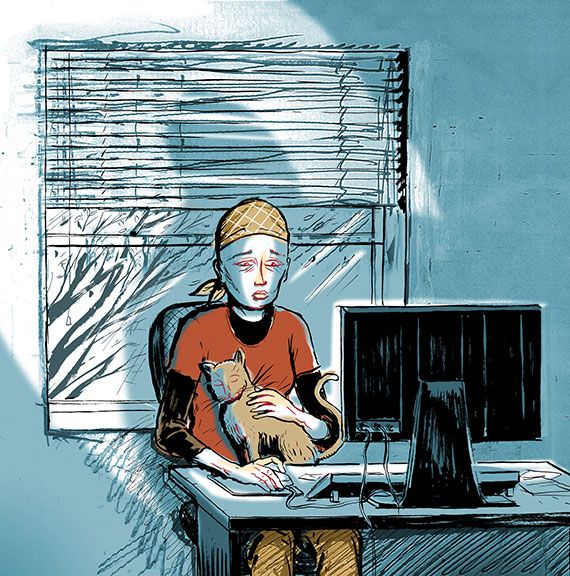
Millions of Americans with disabilities
have gained innumerable rights and opportunities since Congress passed
landmark legislation on their behalf in 1990. And yet advocates say
barriers and bias still abound when it comes to one basic human right:
To be a parent.
A Kansas City, Mo., couple had their daughter
taken into custody by the state two days after her birth because both
parents were blind. A Chicago mother, because she is quadriplegic,
endured an 18-month legal battle to keep custody of her young son. A
California woman paid an advance fee to an adoption agency, then was
told she might be unfit to adopt because she has cerebral palsy.
Such cases are found nationwide, according to a new report by the National Council on Disability,
an independent federal agency. The 445-page document is viewed by the
disability-rights community as by far the most comprehensive ever on the
topic — simultaneously an encyclopedic accounting of the status quo and
an emotional plea for change.
"Parents with disabilities
continue to be the only distinct community that has to fight to retain —
and sometimes gain — custody of their own children," said autism-rights
activist Ari Ne'eman, a member of the council. "The need to correct
this unfair bias could not be more urgent or clear."
The U.S. legal system is not adequately protecting the rights of parents with disabilities, the report says, citing child welfare
laws in most states allowing courts to determine that a parent is unfit
on the basis of a disability. Terminating parental rights on such
grounds "clearly violates" the intent of the 1990 Americans with
Disabilities Act, the report contends.
Child-welfare experts,
responding to the report, said they shared its goals of expanding
supports for disabled parents and striving to keep their families
together. But they said removals of children from their parents —
notably in cases of significant intellectual disabilities — are
sometimes necessary even if wrenching.
"At the end of the day, the
child's interest in having permanence and stability has to be the
priority over the interests of their parents," said Judith Schagrin, a
veteran child-welfare administrator in Maryland.
In the bulk of
difficult cases, ensuring vital support for disabled parents may be all
that's needed to eliminate risks or lessen problems, many advocates say.
The
new report, titled "Rocking the Cradle: Ensuring the Rights of Parents
with Disabilities and Their Children," estimates that 6.1 million U.S.
children have disabled parents. It says these parents are more at risk
than other parents of losing custody of their children, including
removal rates as high as 80 percent for parents with psychiatric or
intellectual disabilities.
Parents
with all types of disabilities — physical or mental — are more likely
to lose custody of their children after divorce, have more difficulty
accessing assisted-reproductive treatments to bear children, and face
significant barriers to adopting children, the report says.
One of
the cases it details involved Erika Johnson and Blake Sinnett of Kansas
City, whose 2-day-old daughter, Mikaela, was taken into custody by
Missouri authorities because both parents were blind. The action
occurred after a hospital nurse reported that Johnson seemed to be
having trouble with her first attempts at breast-feeding — which Johnson
said happens with many first-time mothers.
During a 57-day legal
battle, before the couple regained custody, they were allowed to visit
Mikaela only two to three times a week, for an hour at a time, with a
foster parent monitoring.
Since then, the family has been left in
peace, said Johnson, who tries to offer support to other disabled
parents facing similar challenges.
"Some parents just give up or don't have the resources," she said in a telephone interview.
A
Windsor, Colo., woman with disabilities says the prejudice she
encountered prompted her to go to law school, to better defend her own
rights and those of other disabled parents.
Carrie Ann Lucas
uses a power wheelchair and is reliant on a ventilator due to a form of
muscular dystrophy. She is a single mother of four adopted children,
ages 22, 17, 13 and 11, all of whom also have disabilities, including
two who use wheelchairs and three with intellectual disabilities.
Lucas
says she's been the subject of several investigations by child welfare
officials that she attributed to bias linked to her disabilities.
"Each
one of these referrals that gets accepted for investigation causes a
great deal of stress, not only for me, but for my children," Lucas wrote
in an email.
She said the
investigations dated back to her first efforts to adopt Heather, her
biological niece, in 1999, after the girl was placed in foster care. At
one point in a long procedural struggle, a social worker told a judge
that "there was no way that handicapped woman could care for that
handicapped child."
"We are nearly 13 years later, and Heather is still doing very well," Lucas wrote.
As a lawyer, Lucas has represented many other parents with disabilities.
"I
have had parents with paralysis be threatened with removal of their
children, deaf parents punished for using sign language with their
hearing children, and blind parents told that a social worker can't
possibly fathom how they could parent a newborn," Lucas said. "When
families do need intervention, it is often because the services they
need are not available outside a punitive social services case."
The
lead author of the new report, disability-rights lawyer Robyn Powell,
says her goal was to challenge presumptions that disabled people can't
be effective parents.
"Of course there are going to be some
parents with disabilities who would be lousy parents — that's the same
with parents without disabilities," she said. "If there is neglect, is
it due to the disability? And can it be rectified by providing the
necessary support?"
Ella Callow, a lawyer with the National Center
for Parents with Disabilities and their Families, said the report
raises fundamental questions about America's social priorities — given
that state and federal laws value both the well-being of children and
the rights of disabled people. The ultimate goal, she said, would be to
promote both values by expanding support for disabled parents.
"If
we really believe that families are the key unit on which society is
built, then we have to enable these families to be healthy and
functioning, even at public expense," Callow said. "We know foster care
isn't a good place for children to be — they do better with their own
parents, at their own home."
Callow, who is based in Berkeley,
Calif., said child welfare agencies need to provide more funding and
specialized training with the aim of improving services for disabled
parents.
"Child welfare is so incredibly underfunded, and the
workers are so incredibly overwhelmed, their attitude is, 'Really, you
want my attention on this?'" Callow said. "There's a tendency to think
these families aren't the same as our families. But these children, when
they lose their families, have the same type of grief."
Schagrin,
the Maryland child-welfare official, said she found parts of the report
troubling because they seemed to suggest children were sometimes
removed from their families only on account of parental disabilities.
"That's
not why they are taken away," she said. "They are taken away because
the disability has continued to the point where there's an episode of
maltreatment or neglect."
She
said one recourse is to find members of the extended family — or other
types of support — to help a parent with psychiatric or intellectual
disabilities care for a child. But she said this approach could be taken
too far, for example if a mother with intellectual disabilities was
placed in a group home with other disabled parents.
"What
kind of way is that for a child to live — being raised by a shift of
caregivers in a mom-and-child group home?" she asked. "Is that really
better than an open-adoption agreement?"
Andrea Bartolo, a senior
consultant at the Child Welfare League of America, said there is no
question that some disabled parents encounter discrimination in the
child welfare system, "sometimes inadvertently, sometimes very overtly."
Under
current practices, Bartolo said, an expert assessment of a child's home
life and the possible provision of services to the disabled parents
might occur only after the child has been removed and "the damage has
been done." Going forward, she hopes child-welfare agencies will try
harder to provide support before a problem worsens, potentially reducing
the need for foster-care placements.
The report praises a few
states — including Idaho, Kansas and California — for modifying
child-custody laws to the benefit of disabled parents. It urges Congress
to amend the Americans with Disabilities Act to add protections for
parents, and it calls on state lawmakers to eliminate disability as a
distinct ground for terminating parental rights.
Christine Waters,
an attorney with Legal Services of Central New York, based in Syracuse,
worked with colleagues in 2008-09 in a bid to change the state law
specifying that parental rights can be terminated if a parent has
psychiatric problems or is intellectually impaired. Some legislators
expressed support, Waters said, but the effort ultimately failed.
"Everything
would look like it was going fine ... and then there would be some
well-publicized, awful incident where someone who had a mental illness —
without support — did something shocking and horrible, and a child was
seriously harmed or died and we'd be back to square one," Waters said.
Waters said some child-welfare officials resisted any change, wary of being held responsible if something went wrong.
The
assumption that people with disabilities can't parent "is bad for
society and heartbreaking for families," Waters said. "The easy thing is
to terminate the parental rights. We need to do the right thing, not
the easy thing."
Disabled parents whose parenting ability comes
into question often are placed at a disadvantage by parenting
assessments that are inappropriate or unfair, the report says. It calls
for better research to improve assessment standards and gain more
knowledge about how various disabilities affect the ability to be an
effective parent.
One topic worth further study, it said, is
"parentification" — the phenomenon in which children of disabled parents
take on various caregiving responsibilities, even at a young age.
In
Arlington Heights, Ill., Jenn Thomas, a 36-year-old mom who has
cerebral palsy, says her 8-year-old twins occasionally complain about
having to do a few extra chores around the house to help her.
Her
daughter, Abigail, nods and smiles upon hearing this, but says for the
most part, their lives are "kind of normal." For her, having a mom with a
disability is just how it is, she says, shrugging.
Sometimes,
they ride on the chair with her — especially son Noah because he, like
his father, D.J., is a "little person," the term used by the family and
others for someone genetically predisposed to having unusually short
stature. When activities are farther away, the couple has created a
support network to help when D.J. is working. He drives, but Jenn does
not.
"I want them to enjoy
activities and not be limited because I am limited," she says. So she
coordinates with neighbors to help get the kids to swimming, cello lessons or basketball practice. Or she arranges for "paratransit," a bus service for riders with disabilities and their families.
Friends also helped redesign their kitchen to make it more accessible.
The
new report stresses that improved networks of support for disabled
parents — encompassing transportation, housing, health care, and outside
intervention when appropriate — should be welcomed, and not viewed as
evidence that the parents on their own are incapable.
When
children do face removal from their disabled parents, those parents may
encounter barriers to meaningful participation in their legal cases, the
report says. For example, financially struggling parents may have to
rely on a court-appointed attorney with no special knowledge about the
effects of disability.
Kaney O'Neill of Des Plaines, Ill., a
quadriplegic Navy veteran, endured an 18-month legal battle to keep
custody of her young son. Her ex-boyfriend filed for custody in 2009,
when the boy was 10 weeks old, alleging that O'Neill was "not a fit and
proper person" to care for the child because of her disability.
Refuting
the allegation, with legal help from Ella Callow, Kaney demonstrated
how she had prepared for motherhood by working with an occupational
therapy program, adapting her house, securing specialized baby-care
equipment, and using personal assistants to help her as needed.
"I
lived in fear every single day that my son would be taken away from
me," said O'Neill, 36. "In a lot of ways it made me a better mother
because I felt that I had a lot to prove."
She says her son, who
taught himself to climb up his mother's wheel chair into her lap, is now
going to preschool twice a week and is thriving.
"If you are a
parent with a disability, you don't have a role model — you have to
figure out how you're going to be a mother and overcome challenges," she
said.
For disabled women who
either cannot bear children or choose not to, the possible option of
adoption often can be complicated. Some foreign countries, notably China, rule out disabled people as potential adoptive parents.
Elizabeth
Pazdral of Davis, Calif., who wears a brace and uses crutches to walk
because of cerebral palsy, said she encountered discrimination several
years ago when she and her husband sought to adopt a child. She said one
local adoption agency billed her an advance fee of $3,400, then advised
that there were "serious reservations" about her ability to be a
parent.
"I think it was
dishonest to take my money and then tell me they were worried," said the
4-foot-tall Pazdral, 42, who is executive director of the California
State Independent Living Council.
Initially
distraught, Pazdral obtained legal help, paid for an occupational
therapist to come to her house to assess her capabilities, and
researched how other parents with disabilities had succeeded in raising
children. The efforts paid off: The adoption agency dropped its
objections, and in May 2008, Pazdral and her husband, a Stanford
University physicist, adopted a baby girl named Madeleine.
"It
was a huge life change — but that's true for any new parent," Pazdral
said, recounting sleep-deprived nights, higher levels of chronic pain,
and the challenge of maintaining one's energy level.
"But
I start with the joy I get from being her mother — the rightness I
feel," Pazdral said. "It's the best thing I have ever done with my
life."













 A
young woman begins a regimen of cancer treatment and reaches out to the
internet to share her experience with others who are going through the
same thing. She builds a circle of friends for support, but while going
through her own struggle, finds out gradually two of them are faking
their illness for attention. Playing the patient online is a lot easier
and more common than faking illness in real life.
A
young woman begins a regimen of cancer treatment and reaches out to the
internet to share her experience with others who are going through the
same thing. She builds a circle of friends for support, but while going
through her own struggle, finds out gradually two of them are faking
their illness for attention. Playing the patient online is a lot easier
and more common than faking illness in real life.







 But the rabbits, it turns out, are not hunters at all. They’re some sort
of rabbit police force. Next stop for the hound is the rabbit judicial
system, where he stands trial before a rabbit judge... It’s unclear if
the jury was made up of hounds or hares, but the verdict is swift and
certain. The hound is bound and carried in a cart to the gallows... For
you see, the sentence was death by hanging.
But the rabbits, it turns out, are not hunters at all. They’re some sort
of rabbit police force. Next stop for the hound is the rabbit judicial
system, where he stands trial before a rabbit judge... It’s unclear if
the jury was made up of hounds or hares, but the verdict is swift and
certain. The hound is bound and carried in a cart to the gallows... For
you see, the sentence was death by hanging.
